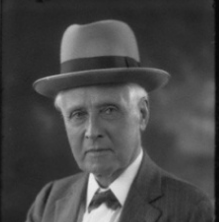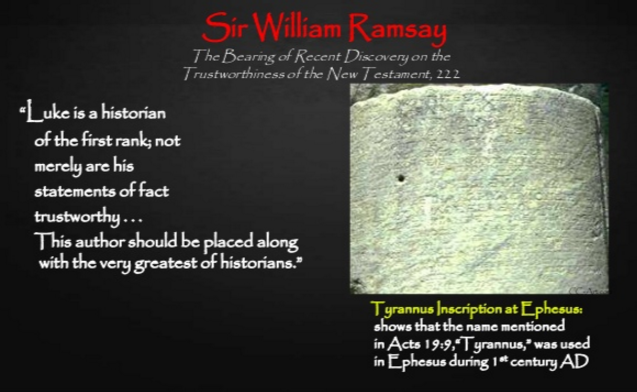Counterpunch on Historical Veracity of the Bible

I see that there are several active posts attempting to question the historical veracity of the Bible. Clearly the attackers have not run across Sir William Ramsay: "First Professor of Classical Archaeology" and "Lincoln and Merton Professorship of Classical Archaeology and Art" at Oxford, and "Regius Professor of Humanity" at the University of Aberdeen, if you are into academic titles.
I'm grabbing a few snippets from his Wikipedia biography which as far as I'm concerned puts the question of historical veracity of Biblical accounts to rest. Here we have a skeptical archeologist who set out to prove once and for all that the New Testament was fiction. He wound up proving the opposite and became a Christian himself.
William Ramsay was known for his careful attention to New Testament events, particularly the Book of Acts and Pauline Epistles. When he first went to Asia Minor, many of the cities mentioned in Acts had no known location and almost nothing was known of their detailed history or politics. The Acts of the Apostles was the only record and Ramsay, skeptical, fully expected his own research to prove the author of Acts hopelessly inaccurate since no man could possibly know the details of Asia Minor more than a hundred years after the event—this is, when Acts was then supposed to have been written.
He therefore set out to put the writer of Acts on trial.
He devoted his life to unearthing the ancient cities and documents of Asia Minor. After a lifetime of study, however, he concluded: 'Further study … showed that the book could bear the most minute scrutiny as an authority for the facts of the Aegean world, and that it was written with such judgment, skill, art and perception of truth as to be a model of historical statement' (The Bearing of Recent Discovery, p. 85). On page 89 of the same book, Ramsay accounted, 'I set out to look for truth on the borderland where Greece and Asia meet, and found it there [in Acts]. You may press the words of Luke in a degree beyond any other historian's and they stand the keenest scrutiny and the hardest treatment...'

When Ramsay turned his attention to Paul's letters, most of which the critics dismissed as forgeries, he concluded that all thirteen New Testament letters that claimed to have been written by Paul were authentic.
Chris White is an excellent researcher, debunker & apologetic. Here is some of his research regarding the Bible.
These are very well done and answer most of the questions people have been sharing here recently.
I think these deserve to be their own post, so they don't get buried way down here.
Appeal to authority is a logical fallacy. Plus, we've learned a lot since his time.
When the alternative is to appeal to the opinions of the inexperienced, uncredentialed and uneducated? This forum is full of personal opinions stated as if they were facts. I offer an unquestionable expert who spent his life documenting those opinions.
So, to counter the actual scientific consensus of today, you dig out a single opinion from the past? From a time, when our knowledge especially in the field of archeology was still vastly inferior? No expert has ever been unquestionable and William Mitchell Ramsay is exactly one of those, whose findings have been thoroughly refuted by the facts we since uncovered.
Just curious. What facts?
thanks in advance for your response :)
Read my Steemit blog. In coming weeks, I'm posting a book full of such facts. So far I've only used published the introduction. Much more to come.
Have you read Ramsay's books and came to a conclusion that they are great work? Or do you just bring up the name because he supports your point of view?
You might want to check also some authors who have more critical view about history of the Bible, like Bart Ehrman.
Usually I look first for most recent authors if the question is about history. Ramsay died in 1939 and knowledge about history of Bible has been advanced after that. Maybe Ramsay had something interesting to say, but it might be better to start with more recent authors if you really want to learn higher quality information.
If you need a more recent author it's hard to beat Josh McDowell. He is the author of some 115 books and references Ramsay's research as part of a comprehensive tour of the evidence behind Christianity. I've even had the pleasure of hearing him speak.
While scientific knowledge undoubtedly advances and therefore Einstein's understanding supersedes Newton's, the uncovering of archeological evidence confirming historical accounts never goes out of style.
So called "evidence" from "textual analysis" presented by "modern" authors designed to cast doubt on ancient documents is typically of the form "here's a place where I could interpret things differently" or "there is no corroborating proof" that what the author said is true or that "remarkable claims demand remarkable proof." They are never of the form "here is irrefutable evidence that the work is a false account."
As an objective professional researcher, Ramsay proved that Luke was a first class historian who knew about things that no subsequent pretender could have known. That kind of information never goes out of date.
Ehrman has his fan club but so does Ramsay. Josh D. Chatraw has criticized Ehrman for the way he cites the "modern scholarly consensus" in support of his claims: "It is only by defining scholarship on his own terms and by excluding scholars who disagree with him that Ehrman is able to imply that he is supported by all other scholarship." Elsewhere, Chatraw suggests Ehrman writes "with a charismatic and appealing style" for a lay audience, but argues that "Ehrman represents a segment of biblical scholarship which he often implies is the only legitimate brand of scholarship, and he rarely exposes lay readers to the best arguments of opposing views."
Look, I don't care (I should, but I don't) whether people want to put their head in the sand and deny the historical accounts that Christianity is based on. I certainly don't want to waste my time arguing with people whose mind is made up and don't want to be confused with the facts. The only reason I bother to point this out at all is to help those who are seeking the truth have a chance of actually finding it in the modern hostile environment (which the Bible also foresaw).
Those who are seeking God will find Him and those who don't want to find Him will not seek.
So be it.
How can your experience be anything but Reality? And if God is Reality, aren't you then part of God? What do facts matter? How can words and concepts do more than hint at the Truth?
The father, the son, the holy spirit; the source, the flesh, the understanding; the tri-unity; what if it's all pointing to an underlying truth that we can all experience, here and now? What if Jesus was a Bodhisattva, what if Buddha was a Christ? The word is flesh, always fresh and vibrant, otherwise it is a lie.
Watch out for dead thoughts in dead tongue. Concepts can become corpses, words can be zombies. What does it really mean to live in the truth, live in the light?
What are we afraid of? What casts shadows on everything? What steals away in the night? What reveals, what blinds? What is hiding, what is seeking? Who can accept, who can forgive, who can appreciate All Things?
The idea that other beliefs can be held simultaneously with Christianity is immediately falsifiable because they contradict each other. You have to choose. Christianity is fundamentally a historical religion grounded in real historical events dating back 6000 years. So its perfectly reasonable to talk about history as His Story.
Jesus himself spoke about these times, as captured in Matthew 24:4-14: